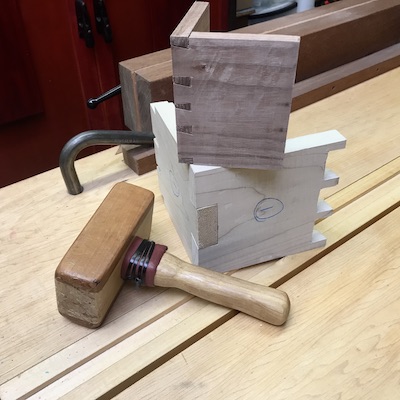Musings on mastery
Why do we linger at the dinner table? It may be that family or cultural tradition demand it. A digestif – a shot of alcohol or coffee – may be served to encourage digestion or stave off drowsiness. Some of us take our time leaving the table so we can nurse a full stomach after a very memorable meal. We are allowing ourselves time to talk, listen, or bask in the surreal feelings generated throughout the evening.
What is the meaning of this? It means I am lingering at the table of the dovetail feast. I’m not ready to get out of my seat!
Adjusting the focus
The saying that “practice makes perfect” is known by most everyone on the planet. I say “practice makes practice”.
Any skill can be learned by anyone who is willing to put in the time and effort. Yes, I believe that you or I can gain competence in anything we choose.
Intense, sustained training over time is only part of the answer to how a master got that way. Expertise and perfected execution may be his or her goal. Regardless of that goal, it needs to be internalized to prevent aimless wandering.
It is easy to practice for much of our waking hours when we are younger. Often we are encouraged or helped along the path. For some, that path to mastery may even be cleared so that it is the only thing we have to do.
As we get older, life transitions require and deserve attention. Skill work requires greater concentration and dedication. Time starts to feel short while the path to “perfection” seems long. The scenario fuels fear which affects us not only mentally but physically.
The 10-year rule is a widely accepted and debated theory about learning and developing a skill. It discusses skill development and provides evidence that to be competent takes about a month, reasonably good takes about a year, and a master takes, maybe, ten years.
Incomplete. The theory is.
The question to ponder is this: how is mastery recognized? By whom? And where does mastery reside? Is it a regulated, cultivated or nurtured finite piece of humanity? For whom and how many? Any woman or man can recognize and exploit their own genius. Many walked the earth, worked the land and toiled unrecognized as “skill masters”. Then they died.
Their knowledge, wisdom, and secrets were absorbed and manifested by:
- the next door neighbor who made Michelin Star quality desserts from crème brûlée to sweet potato pie and shared or sold them from her back door,
- the backyard herbalist who knew and recognized the medicinal quality and application of anything growing in the earth,
- urban mechanics, often apprenticed in the neighborhood, who diagnosed and repaired cars without sophisticated tools or equipment,
- self-taught guitarists, pianists, and other artists who performed at house parties and the neighborhood juke joint,
- the seamstress who could whip up her own patterns and outfits in “a couple of days”,
- the basement hairdresser or barber who did their thing with our hair,
- the old handyman, owning very few tools, who troubleshot and fixed almost anything for anyone.
And the list goes on. We lived with these people. Many of us were raised by them. We witnessed their suffering, often in harsh, resource-deprived, and politically restrictive environments. We cannot begin to count the many dreams deferred. And these were the skill masters just where I lived.
There were many more. These ordinary beings did – and do – extraordinary things as humanity’s uncounted masters.
A very short perspective on pace
Time is time. Do we need to mindlessly rush to accomplish almost every objective in life before age 30? It’s an insult to the rest of your life! For me, the best feeling is learning or experiencing something special for the first time beyond the conventional expiration date. There is a recipe for that: it combines maturity, temperance and wisdom layered with critical thinking and observation.
I appreciate it better and have a more thoughtful experience. Those “what was all the fuss about?” thoughts will appear after I do most of them, believe me. I try to take my walk in life at a steady pace gauging what and how much I can handle each day.
Other debated theories offer, like dessert, something for anyone to pick and use. I think some of them make valid points and serve a purpose, but the main point is to begin. Being a consistent practitioner in a skill does not guarantee mastery. The long path may reveal a truly personal meaning like why or whether you should be doing it at all.
For hesitant hands
Say yes to all those things and to the desire to be good, a master or the very best. Whatever the choice happens to be, go with it. Don’t be disheartened if you’re just starting out in what you might feel is too late in life.
Think on that. Let the sad feelings of missed opportunities, wasted time, and wrong choices visit with you for a little while. Then let that digestif deliver its magic.
Open your eyes.

Then look at it this way, you’ve got ten years to do it! If it’s way past retirement age, then floor it!
Wait. Don’t do that. Just forget all the reasons keeping you from starting. You’re only a few minutes late.
It was my fear of failure that first kept me from attempting the master work. Now, I’m beginning what I could have started ten years ago. But I’m happy at least that I didn’t wait twenty years.
– Paulo Coelho
All right… I’m up from the table.
S♥️
———
How the feast began:
A Dovetail for Breakfast: Part 1


2 thoughts on “● Dovetail Digestif”
“For me, the best feeling is learning or experiencing something special for the first time beyond the conventional expiration date.” Brava!
Obrigada!
Comments are closed.